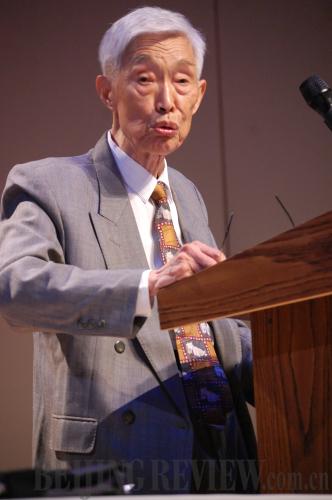|
 |
|
Bao Shixiu, Professor of Military Affairs and Senior Research Fellow at the Academy of Military Sciences, People's Liberation Army, make a speech on June 15 at the 30th anniversary conference of the Schiller Institute in New York City (FILE) |
Two thousand years ago, the ancient Silk Road connected merchants in Western China to the heart of Rome and formed the cornerstone of a wave of technological and cultural advancement for humanity. Now, a new Silk Road is forming that will connect 3 billion people in China and Central Asia and create the single biggest market in the world, said renowned author Bao Shixiu, Professor of Military Affairs and Senior Research Fellow at the Academy of Military Sciences, People's Liberation Army.
"The very mention of Silk Road evokes memories of the good old times for the western region of China. Now, plans are afoot to bring back the glory days as China proposes a modern version of the world famous trade route," said Bao, speaking at the 30th anniversary conference of the Schiller Institute in New York City on June 15.
Chinese President Xi Jinping proposed to establish a Silk Road Economic Belt in a September 2013 speech at Kazakhstan's Nazarbayev University. The trade route is built on the modern railway network from China to Central Asian countries, a massive expressway that joins Europe's E40 road, and land and airports throughout western China.
"A comprehensive transport network across China and Central Asian countries, including railways, roads and air travel has now been established. The revival of the Silk Road can be expected soon," Bao said.
Like the Silk Road of ancient times, the modern economic cooperation is built on a "growing willingness to collaborate" rooted in Asian countries' shared aspirations for peace and development, Bao said. Evidence of this spirit of cooperation can be found at a recently concluded Shanghai summit of the 26-member Conference on Interaction and Confidence Building Measures in Asia (CICA).
"While redoubling their efforts to rev up economic growth, improve living standards and maintain social stability, [CICA members] must cement bonds with one another in pursuit of greater benefits. Take China for instance. The rapidly emerging economy is ready to share its opportunities with neighbors, as the New Silk Road Economic Belt and the Maritime Silk Road of the 21st Century. At the same time, it needs their cooperation in addressing problems such as terrorism, cross-border crime and drug trafficking," Bao said.
The strength of the region has become more evident since the 2008 global financial crisis. The relative stability of Asian economies was "a blessing to humanity," Bao said, as the sustainable development of Asia accounts for about two thirds of the world's population and one third of its total GDP.
"No country should seek absolute security of itself at the expense of others. We cannot just have security for one or a few countries while leaving the rest insecure. A military alliance which is targeted at a third party is not conducive to common regional security," said President Xi at the CICA summit.
The rise of Central Asia should not be viewed as a threat to global stability, Bao said. Since 2009, U.S. President Barack Obama has taken measures to openly oppose China in territorial disputes and has sought to "rebalance" U.S. power in the region—a move Bao sees as a measure to consolidate American dominance in Asia.
"Chinese President Xi stated that 'security problems in Asia should be solved by Asians themselves who are able to achieve regional peace and stability through cooperation,' " Bao said. "Yes, 'security problems in Asia should be solved by Asians themselves;' outsiders should consciously exit the game. "
YouTube link to speech
https://www.youtube.com/watch?v=U0Kj7bhy-pc
The author is a contributing writer to Beijing Review, living in New York City | 